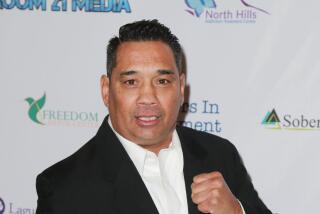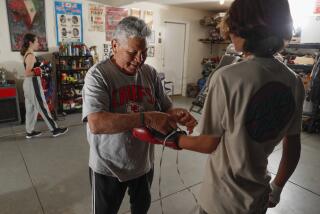McCain’s disability pension may renew questions about his fitness
Sen. John McCain has long said he is in robust health and is strong enough to hike the Grand Canyon, but he also is receiving what his staff Monday termed a “disability pension” from the Navy.
When McCain released his tax return for 2007 on Friday, he separately disclosed that he received a pension of $58,358 that was not listed as income on his return.
On Monday, McCain’s staff identified the retirement benefit as a “disability pension” and said that McCain “was retired as disabled because of his limited body movements due to injuries as a POW.”
McCain campaign strategist Mark Salter said Monday night that McCain was technically disabled. “Tortured for his country -- that is how he acquired his disability,” Salter said.
Certain types of military and veterans pensions are either partially or completely tax-exempt, depending on the seriousness of the disability. In McCain’s case, the exemption is 100%.
If McCain had to pay taxes on the full amount of the pension, it would have increased his tax bill by about $18,000 based on the percentage of his income he paid to the federal government.
McCain spent 5 1/2 years as a prisoner of war in Hanoi. After he was released in 1973, he returned home on crutches and began a painful physical rehabilitation. He later regained flight status and commanded a Navy squadron before retiring from the service in 1981.
McCain would be the oldest man to enter the White House if he is elected president, and questions have been raised about his health.
McCain has twice developed melanoma, a potentially deadly form of skin cancer.
The fact that he is legally designated with a disability pension may raise further questions.
“It is a legitimate question to ask about the commander in chief: Is he fit to serve,” said Robert Schriebman, a senior Pentagon tax advisor and tax attorney who recently retired as a judge advocate for a unit of the California National Guard.
If McCain can hike across the Grand Canyon, then why should he be getting disability payments from the government that are tax-exempt, Schriebman asked.
McCain shattered his knee and broke both arms when he was shot down over North Vietnam in 1967.
In his autobiographies, McCain said that his knee still bothered him in cold weather and that he was unable to raise his hands above his shoulders.
Elmo Baker, a retired colonel and president of a Vietnam War POW group, said many former POWs were receiving some type of military pension that was partly or fully tax-free.
Baker said he was receiving payments that were 70% tax-free, but that he “didn’t have as many injuries as McCain did.”
Many of the Vietnam POWs are receiving payment under a program known as “combat-related special compensation,” which provides benefits and tax exemptions under a complex system, based on such factors as the type of injury and the years of service.
Paul Galanti, another former POW in the group, said that while McCain’s injuries were serious enough to qualify him for disability, it would not affect his performance as president.
“I don’t know of any physical requirements to be commander in chief,” Galanti said. “He would have a nice car to drive around in and a nice airplane to fly in.”
--
ralph.vartabedian@ latimes.com
Times staff writer Maeve Reston in Alabama contributed to this report.
More to Read
Get the L.A. Times Politics newsletter
Deeply reported insights into legislation, politics and policy from Sacramento, Washington and beyond. In your inbox three times per week.
You may occasionally receive promotional content from the Los Angeles Times.











